Just days after giving birth to her daughter Ava, Destiny Munoz knew something wasn’t right.
For the next three weeks, Munoz and her husband Marcello waited anxiously as doctors worked to figure out what was going on with their tiny newborn. At times, it was a struggle just to keep her alive.
“It was a pretty dire situation,” Munoz says. “She almost died. It wasn’t until she was two months old that we finally got her diagnosis.”
Ava, now 3, has Prader-Willi syndrome, also known as PWS, a rare genetic disorder that results in physical, mental and behavioural problems.
PWS is characterized by severe hypotonia (decreased muscle tone), poor appetite and feeding difficulties in early infancy, followed by excessive eating and gradual development of morbid obesity in early childhood if food intake isn’t strictly controlled. Motor skills and language development are also delayed.
The syndrome occurs in one out of every 22,000 births; the average life expectancy is 30 years.
“It’s a genetic syndrome and it happens by random occurrence. We could never have predicted this,” Munoz says. “The biggest thing is she doesn’t have the ability to regulate the feeling of being full, so eventually it might become this feeling of constantly being hungry.”
She adds: “It’s not extreme yet, but as time goes on, this syndrome is such a spectrum that we don’t know how things are going to affect her.”
Munoz described the first year of Ava’s life as a roller coaster ride, filled with appointments and meetings with every specialist support group available to her. Ava continues to receive speech, occupational and physiotherapy every month.
It was during a physio session that the therapist recommended that Ava, who was six months old at the time, be added to the waiting list at Seven Oaks Child Day Care Centre, which is known to be inclusive-friendly. Munoz had been pondering the idea because, while they had family help, they needed more structured support.
“They put her on the list at Seven Oaks and told us she would be lucky to get in at two years old,” says Munoz, who has an older son and is no stranger to the long wait times for a daycare space. “I would phone every three months to see how things were.”
It would take two and a half years to get the spot.
Munoz was in regular contact with Seven Oaks director Susana Lam, who assured her she was working hard to find Ava a space. Lam finally delivered the good news in June 2023, but said they were still waiting to hear from the Manitoba government on whether Ava was eligible for funding through the Inclusion Support Program (ISP).
ISP is fully funded by the province and administered through Early Learning and Child Care (ELCC) programming. ELCC determines how many hours will be funded for the required extra staff, depending on the child’s specific needs.
Ava needs continuous one-on-one attention to monitor what and how much she eats and drinks each day. This requires almost daily contact with the family to discuss her diet. With PWS, she’s a greater flight risk and trusts easily. She’s also prone to falling and getting injured.
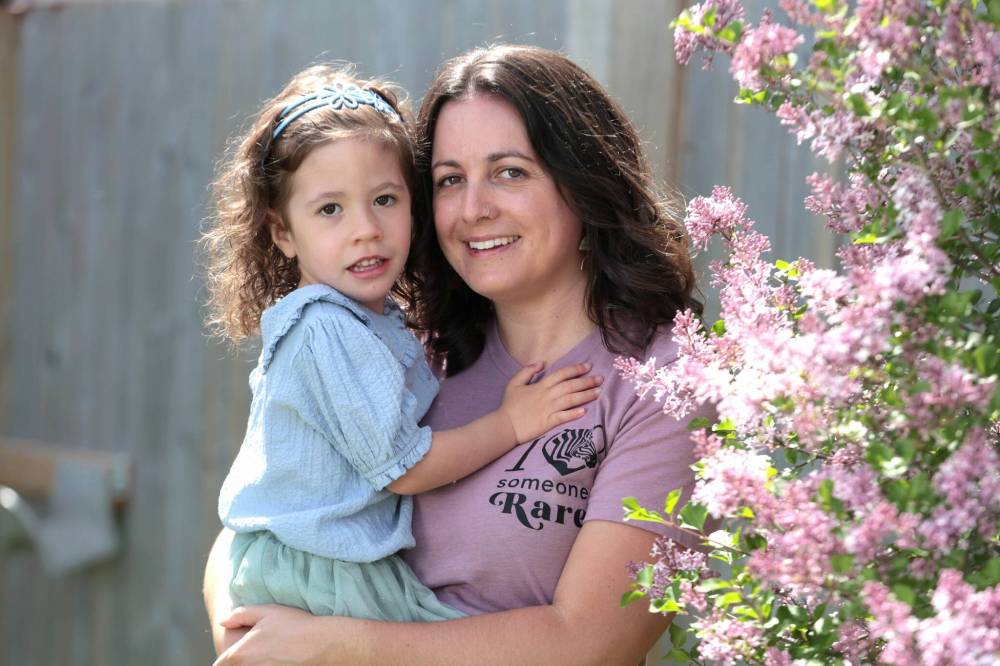
RUTH BONNEVILLE / FREE PRESS
Destiny Munoz and her daughter, Ava, who was diagnoised with Prader-Willi syndrome at two months old. The rare genetic disorder results in physical, mental and behavioural problems.
Given Ava’s challenges, Munoz figured her daughter was as close to a slam-dunk ISP applicant as they come. Instead, ELCC only approved support for a few hours per day.
“Susana said she was sorry, but they just aren’t being given enough support hours to feel they can safely support her in the centre. To think we’re almost there and then it’s over because we can’t support her safely,” Munoz says. “On the advice of the centre, I wrote a long letter advocating for more support and explaining how the system is going to fail her if they don’t give her one-on-one attention for a full day.”
Munoz credits her job as a social worker for providing her with the wherewithal to navigate the complicated process. Seven Oaks forwarded her letter to their provincial co-ordinator in charge of the ISP funding. Weeks later, Lam called to say Ava’s hours had been increased to seven per day and that she could start attending that September.
Even now, the constant threat of losing funding lingers like a dark cloud over Ava’s family. To accommodate the ISP’s detailed application forms, Munoz and Seven Oaks staff are constantly documenting Ava’s challenges to prove her worthy of funding.
“Why can’t we focus on some of the strengths and the things that she needs in place to be doing well? Instead, we’re making her sound like this awful little child with a disability,” Munoz says. “I feel terrible sometimes because I have to say all these terrible things about her. But if I don’t say them, she’s not going to get the support that she needs. It’s retraumatizing for me to have to keep repeating certain things over and over and over again.”
Munoz sighs deeply before continuing.
“It makes me sick, and I often feel this intense guilt that I’m fighting for my daughter so hard and there are other kids that don’t have that. The whole process is sickening,” she says. “I don’t feel like my kid is more deserving than anybody else, but she just has somebody like me who is going to push for it because I know what she should be getting. Why aren’t all kids getting what she’s getting?”
As part of a months-long investigation into the state of child care in Manitoba, the Free Press examined the Inclusion Support Program. It’s designed to help the province’s most vulnerable children; in reality, it’s a bureaucratic nightmare that creates more problems than solutions, leaving families feeling abandoned.
The Inclusion Support Program is designed “to reduce or eliminate barriers to allow a child with additional support needs to fully participate in an early learning and child care program,” according to the province’s Early Learning and Child Care website.
It adds: “all children should have equal opportunity to access licensed child care in their community.”
That’s not how Susana Lam sees it.
Lam is the director at Seven Oaks Child Day Care Centre who worked closely with the Munoz family to secure Ava a space in their program. She would love to say every child who requires additional resources just needs a supporting letter from a desperate parent, but that’s hardly been her experience.

RUTH BONNEVILLE / FREE PRESS
Susana Lam, director at Seven Oaks Child Day Care Centre.
“Inclusion has been under the radar, and no one seems to know there’s a huge issue with it. Things are being said out there about what’s going on, but it’s still kind of brushed under the rug,” Lam says, the frustration clear in her voice.
“It’s ridiculous because it’s a safety risk and unfair to the child. It’s just been a lot of fighting, and I mean fighting as in literally arguing with your (centre’s) co-ordinator on the phone. Arguing and arguing; there are loud voices, tears, everything, because I don’t think it’s fair that these families and children have to fight so hard to get a spot.”
Remarkably, Lam says, what the Munoz family experienced, while equal parts unnecessary and cruel, is considered a success story because funding support was finally provided.
Lam says it feels like she’s been in an uphill battle with the province for much of the five years since she was promoted to her role as Seven Oaks’ director.
“Why am I fighting to get hours for this child? Do you see his diagnosis? Do you see what he needs for support? Why am I fighting this?” Lam asks rhetorically. “I request to speak to someone above the (provincial) co-ordinator and they don’t allow it. There’s no one. You’re left at a complete loss.”
“I don’t think it’s fair that these families and children have to fight so hard to get a spot.”–Susana Lam
Lam can recall the first time she encountered resistance from the province and how it left her head spinning when funding was denied. It involved a one-year-old boy who was diagnosed with Bohring-Opitz Syndrome, a severe medical condition that left the child prone to vomiting, sometimes several times a day, and requiring him to be tube-fed.
The boy isn’t able to sit up on his own and requires constant attention to keep him engaged and develop meaningful connections with his classmates. A lack of one-on-one care would not only stunt his development, but put his life at risk.
Still, the child was denied funding, with the province saying they don’t fund ISP infants.
That rationale was a first for Lam. It would take a lot of fighting, but the government eventually caved.
“He has a serious medical need and you’re telling me to put him in the 1:4 (regular staffing) ratio with the other infants. Oh my God, that blew me away,” she says. “Inclusion is so important to me and our program that I just didn’t understand why they were denying him and doing this to the family and child. Then it happened the following year with another child. By then, I expected it. I went in ready. But not that first time. That first time took a toll on me.”
The Manitoba Child Care Association (MCCA) has nearly 4,000 members and offers support to about half of the child-care centres in the province. The MCCA surveyed those centres in 2023, with the results presented to provincial election candidates last September.

JOHN WOODS / FREE PRESS
More than one-third of the Manitoba Child Care Association’s 2023 survey respondents said they had been forced to deny care to one child because they couldn’t secure government funding.
When it came to the ISP, more than one-third of the respondents said they had been forced to deny care to one child because they couldn’t secure government funding. Nearly the same number of centres said they’ve denied two. More than 10 per cent had denied care for four children, and eight per cent had denied care for five or more children.
This data excludes facilities that no longer accept applications for children with special needs because they’ve become fed up with the process.
The province mandates that all licensed child-care centres, including home-based ones, have an inclusion policy, but there is no enforcement to ensure that they are accepting children with additional support needs. The province has 13 diversity and inclusion co-ordinators, two supervisors and one manager.
Tracy Cosser has more than 30 years’ experience in child care and is the executive director of Can You Imagine Preschool and Educational Centres in the Elmwood and Weston areas. After repeatedly being denied ISP funding over the phone, she decided to take a different approach.
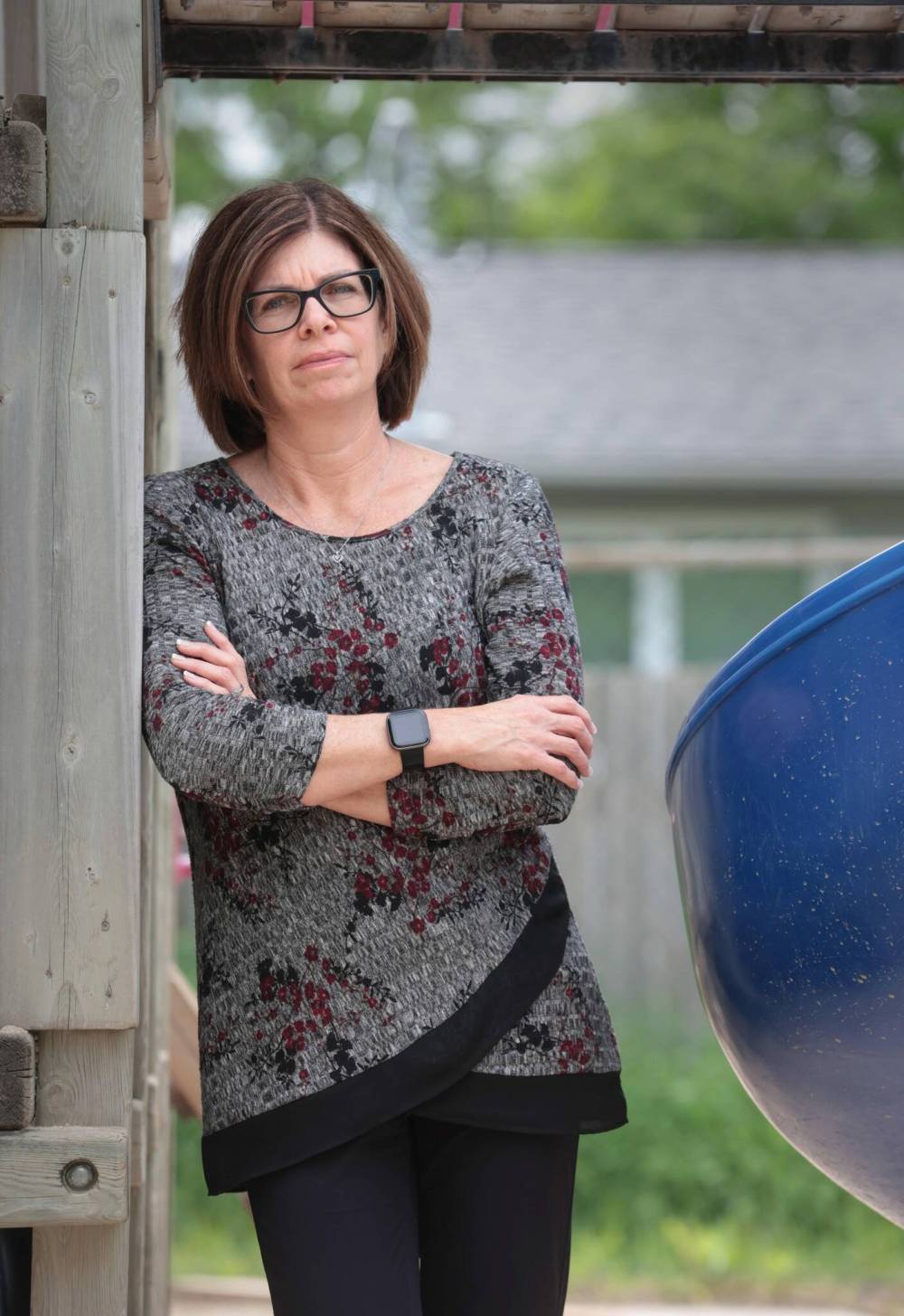
RUTH BONNEVILLE / FREE PRESS
Tracy Cosser, executive director of Can You Imagine Preschool and Educational Centres, says the hurdles put up by the province have reduced her ability to help more children.
Her breaking point involved two cases where she says there shouldn’t have been a debate over funding.
One was a non-verbal five-year-old boy who had an ostomy bag, a central venous catheter and feed tubes for medication, requiring regular visits to the hospital. He got six hours of funding per day when he needed at least eight.
When she sought funding for another boy who couldn’t walk and had behavioural issues — calling it arguably the most challenging case she’s ever seen — her ISP co-ordinator said they still needed more information.
“After that, I started to say, ‘You need to come in,’” Cosser says. “They didn’t believe me. But she saw it with her own eyes. She would come in and observe, and we got funding fairly quickly after that.”
Cosser says despite the centre’s efforts and her passion for supporting kids needing the ISP funding, the hurdles put up by the province have reduced her ability to help more children. Her biggest fear is the problem is only going to get worse, as she’s seeing more and more children in desperate need.
“We’re doing the work and (the province is) just making it harder for us to include these kids,” Cosser says. “The process has got to change because it’s so challenging, and I hate this for families.”
The issues surrounding the ISP are compounding the system’s current state of upheaval. A lack of qualified staff, low wages, years-long wait lists and a woefully insufficient number of daycare spaces are persistent problems.
At the time of the ELCC’s 2022-23 annual report — the most recent one available — there were 1,013 licensed facilities in the province, including 697 centres and 316 homes.
Fifty per cent of the centres participated in the ISP program compared to only five per cent of home-based centres, with a total of 1,242 children receiving some form of funding. Jodie Kehl, executive director of the MCCA, says that because centres still struggle to obtain ISP funding, and because others have stopped applying for it all together because of the many hurdles in obtaining the support, the needs of many children are being ignored.
Sherry Gott, the Manitoba Advocate for Children and Youth, says it’s long overdue for the province to step up and address the needs of these kids and their families.
“It’s a human rights issue,” Gott says, adding that some families have contacted her office about the insurmountable challenges they face.
“It’s a right for these children with disabilities to have that support. It’s very concerning that they aren’t giving them these appropriate supports for them to thrive.”
Gott says the United Nations Convention on the Rights of the Child makes it clear governments must do all that they can to support disabled children and their families.
“The government wants us to promote UNCRC, so why aren’t they stepping up?” Gott asks.
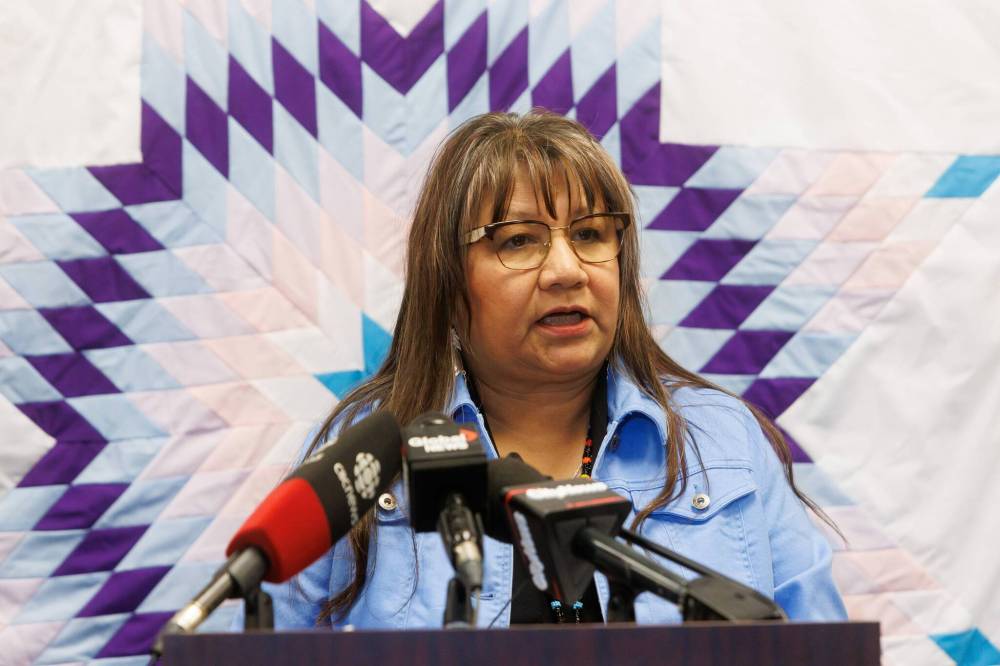
MIKE DEAL / FREE PRESS FILES
‘It’s a human rights issue,’ says Sherry Gott, the Manitoba Advocate for Children and Youth.
A provincial spokesperson said the ISP budget has increased by 52 per cent to $20.6 million since the signing in 2021 of the Canada-Manitoba, Canada-Wide Early Learning and Child Care Agreement, which included $1.2 billion from the federal government. No breakdown of the increased budget was provided, though the spokesperson said funding could go towards specialized equipment, renovations, staff training and hiring new staff.
Additionally, the province has created a specialized ISP team with a new delivery and funding model to streamline the application process, the spokesperson said. That diversity and inclusion team includes professionals with backgrounds in disabilities, child development, child care and clinical social work.
“The team also provides child development services, and sector feedback has been quite positive,” the spokesperson said. “The department continues to explore ways to further streamline processes to better support facilities in meeting the needs of children.”
The ISP has had a rocky recent history. In 2017, the then-Pallister Conservative government announced it would no longer fund new applicants to the program. It immediately backtracked in the wake of fierce opposition.
Then, in June 2019, ELCC introduced a new ISP eligibility application form and assessment process.
There had always been guidelines to determine who was eligible — for both the family and facility — but several directors say this transition created more hurdles.
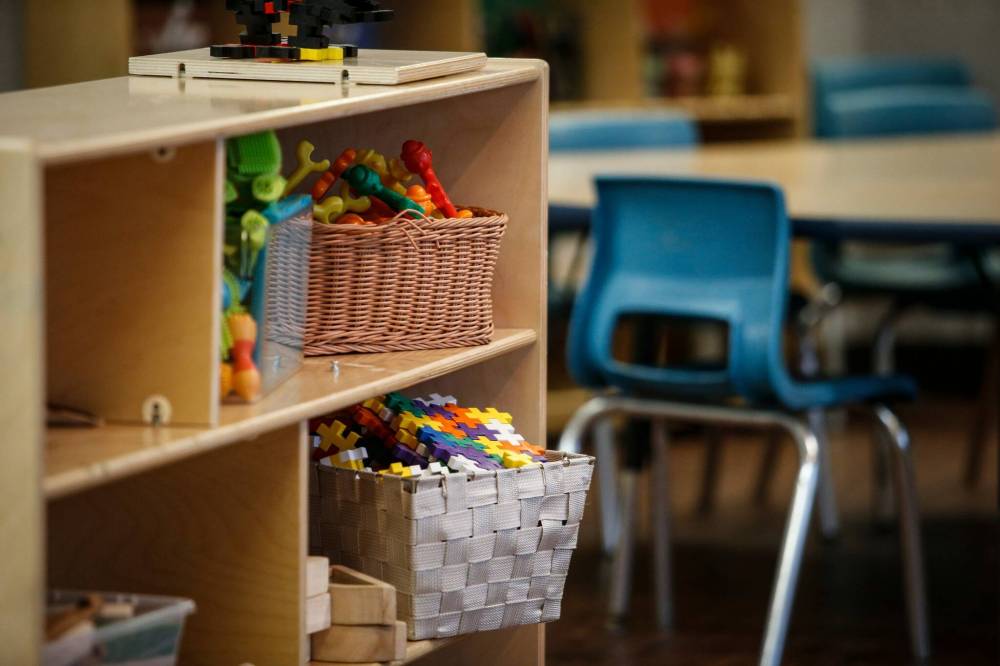
JOHN WOODS / FREE PRESS
A provincial spokesperson said the ISP budget has increased by 52 per cent to $20.6 million since the signing in 2021 of the Canada-Manitoba, Canada-Wide Early Learning and Child Care Agreement, which included $1.2 billion from the federal government.
“Since I was a co-ordinator (in 2012), they’ve changed the process three different times and it’s still no better,” says Lynn Martin, who is now the director of Early Learning and Child Care Thompson, as well as Kiddies Northern Preschool.
“Now you have to first find out if you’re eligible for the program to even apply for the funding. Then you have to make it look like (the children) are a significant risk to themselves and others in order to get the funding. After that, it’s constant paperwork to keep the funding going.”
Many directors told the Free Press they almost feel lucky when they’ve reached the stage where they’re drowning in paperwork, because at least that means they’ve received some support.
Under the policy, children hoping to receive additional care fall into two categories:
1) A child with a diagnosed life-long or permanent disability and/or is eligible for Children’s DisABILITY Services;
2) A child who exhibits behavioural or emotional difficulties characterized by impaired adaptive functioning, which disrupts the child’s ability to adequately participate in activities, with these behaviours continuing over a period of time.
In simpler terms, one path is for children who have already been diagnosed, the other is for a child with behavioural concerns but without an official diagnosis.
David Kron is chair of the Children’s Coalition, an ad hoc group representing different organizations that provide services and supports to families, and deal with Children’s Disability Services and Child and Family Services. He’s also the executive director of the Cerebral Palsy Association of Manitoba.

MIKE DEAL / FREE PRESS
David Kron, the chair of the Children’s Coalition and Executive Director at Cerebral Palsy Association of Manitoba.
Kron says he has stories dating back to the 1990s about the struggles of families and daycare centres trying to get ISP funding. He says the Children’s Coalition helps families navigate the difficult system and they’ve seen an uptick in the number that never get off a waiting list.
“We’ve seen it: if there’s a hundred people on the waiting list, and the person running the centre knows that a child has a disability, they just go to the next person on the list,” Kron says. “It’s happening all over the place, not just here in Winnipeg but also in rural Manitoba, where it’s even worse.
“The human rights system is so backed up with complaints with folks with disabilities that it’s seven or eight years before you get a hearing and result,” he says. “It’s just crazy. I don’t know how families do it.”
Most directors agree kids with a medical diagnosis usually have a better chance of being approved for funding, even if they might not get enough support hours. But then there are those families stranded on a health-care waiting list to get an official diagnosis.
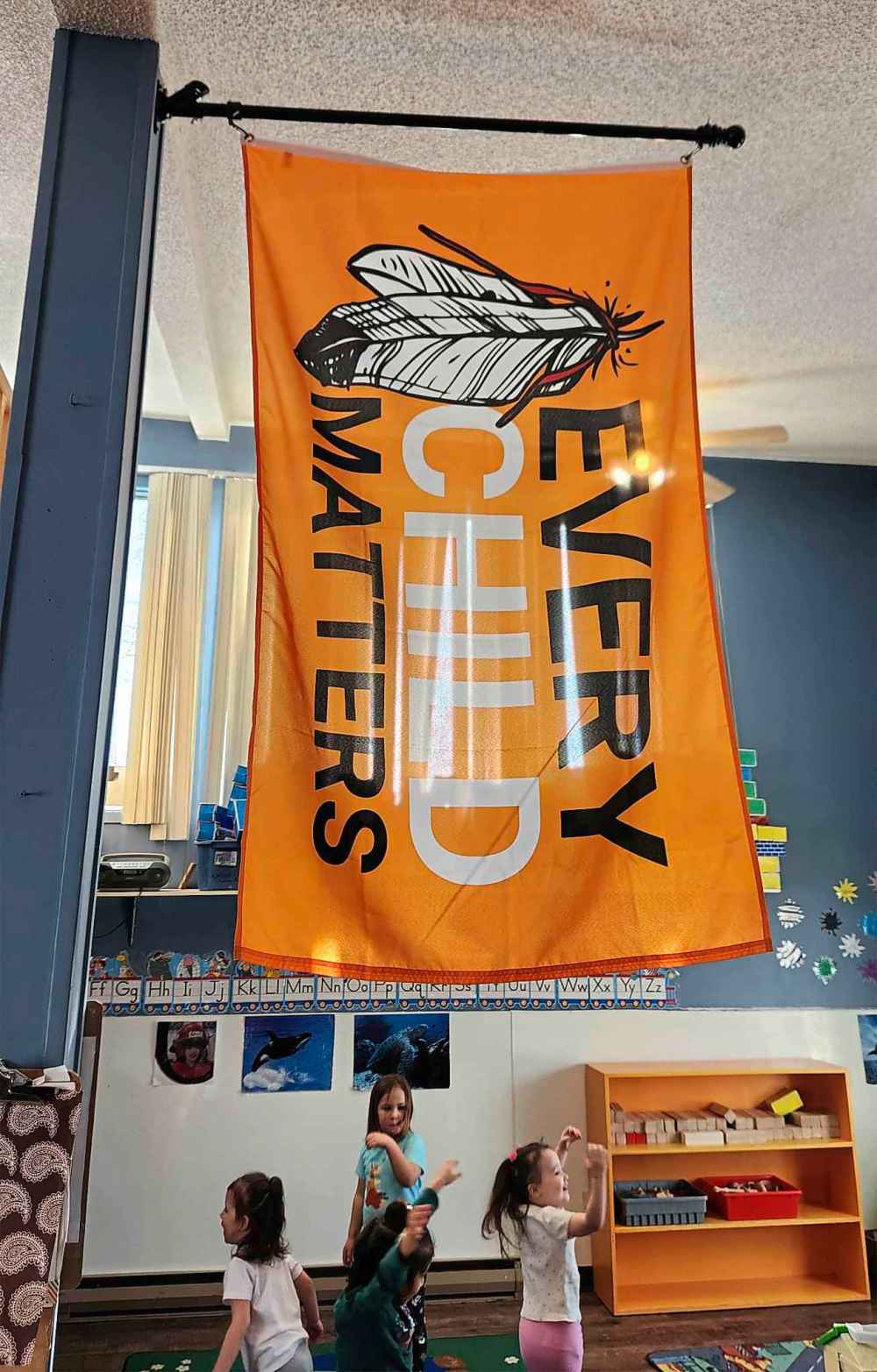
JEFF HAMILTON / FREE PRESS
Teekinakan Day Care Centre in Thompson.
Anne-Marie Bosters is the executive director of Teekinakan Day Care Centre in Thompson. When the Free Press spoke to her in March, she was struggling to obtain ISP funding for a four-year-old boy who had autism, but was without a diagnosis and on a two-year waiting list for an appointment with the Child Development Clinic.
“I’ve spent six months trying to get inclusion support for him, because as he’s getting older and is non-verbal, he’s getting more frustrated because he can’t communicate, and he’s got all these things where everything has to be a certain way. It’s hard. He needs inclusion support,” Bosters says.
“Well, finally, they gave me five hours a day. He’s there for eight hours a day. So, what am I supposed to do for the other three hours a day he’s there?”
Trying to secure funding for a child with significant behavioural issues is a greater struggle.
It has become such a challenge for Heidi Dueck, who is a supervisor at Prairie Nature Children’s Centre, that it’s like a second job trying to get funding for kids she describes as having “big emotions.”
Knowing she’ll likely be denied ISP funding without thorough documentation, she spends hours at home each week writing pages of observations of children in her care.
In order to do that, the children must be in the program for weeks, if not months, without any additional support. That puts more stress on staff, many of whom already feel underpaid and underappreciated.
“I’m experienced, so if I’m telling you a child needs funding, it’s not because they’re a biter or they just have big emotions, or they are tired. They’re running away. They are threatening to kill themselves. These are little kids. They are huge concerning behaviours,” Dueck says. “While you’re trying to save their life or save other kids, you’re getting bitten to the point where you’re bleeding. You’re getting kicked and bruised. You’re getting beat up.”
She adds: “Most people have no idea what the needs of kids are. I have never seen it like this before in my 20-plus years, and it’s just increasing.”
Once they’re deemed eligible for funding, centres are asked to complete an ISP Service Planning Request for Child-Care Facilities form, with as much supporting documentation as they can provide. The form is a three-page questionnaire seeking everything from clinical and health-care reports to medical needs and safety issues to even estimating the anticipated length of a child’s naptime.
The forms are filled out before funding is granted and again to justify the ongoing care. If a child is accepted for ISP funding at one centre and moves to another, the process starts over again, as if the previous paperwork never existed.

JOHN WOODS / FREE PRESS
Inclusion Support Program is fully funded by the province and administered through Early Learning and Child Care (ELCC) programming. ELCC determines how many hours will be funded for the required extra staff, depending on the child’s specific needs.
If a centre secures the appropriate number of hours through ISP, directors say they’ve only won the battle. The war is keeping the funding, through intense documentation, while also trying to find qualified staff to ensure the child is getting the best possible care.
“They want records of every day, of every minute,” Cosser says. “They make you submit assessments on anything. We do a service plan. We do centre documentation, and then they want more. We don’t have time – because we’re actually caring for children – to be doing all of this documentation.”
Previously, a centre would receive ISP funding for an entire year, but ELCC has shifted coverage to a shorter period of time, such as a month or two, allowing it to re-evaluate the need. That also applies to children who have lifelong disabilities, such as autism.
“I understand that they have to do their due diligence, I understand that the government has its budget and they want to make sure they’re providing services for children that need it…,” says Mariëlla Carr, the executive director of Prairie Nature Children’s Centre.
“But we’ll be documenting all year, because if you don’t, you don’t get anything. Then you are kind of beating your head against the wall. It makes you ask: are all children really welcome?”
What further frustrates Carr is that ELCC policy only provides funding at the lowest rung of the wage grid, at $17.51 an hour, which is what’s paid to a child-care assistant. The actual required wage is routinely higher to attract qualified staff, meaning centres that prioritize inclusive programming must find additional money on their own.
Finding those qualified workers is extremely challenging. Early childhood educator programs focus on typical child development and not practical strategies for working with children with unique needs, the MCCA says. Child-care assistants — the profession’s introductory position — are only required to take a 40-hour course, with no previous experience working with children with special needs.
“I’m not going to have some young 18-year-old with no experience, who is afraid because the child is throwing furniture or whatever is going on,” Carr says. “We’ve just decided to pay a bit more and have extra people on our team, but it’s killing us. I’m now in the process of working on our budget and every year there’s never any wiggle room to give anyone even a dollar more an hour. That’s just impossible. It’s so frustrating.”
April Kalyniuk, from Lord Roberts Children’s Centre, said she was stonewalled when she tried to get a modest wage increase for her staffing working with children with special needs.
“(I was told), ‘If we don’t give it to you, what are you going to do?’ I said, ‘Well, I guess we’ll just stop taking children with additional support needs.’ Who says that? I don’t say that,” Kalyniuk says. “Imagine a school saying that to someone. We can’t take your kid because we can’t support them. There would be a human rights case filed.”
It’s been years since Cathy Gardiner has applied for ISP funding. It’s not something she’s proud of but she says it’s a decision made thanks to a system that is designed to fail both children and child-care centres.
“I’m of the opinion that if you’re not going to fund me what the child needs, then I don’t have the capacity to care for this child,” says Gardiner, who is the executive director at Learning & Growing Daycare in Charleswood. “I have empathy and compassion and I don’t want to sound like a cold-hearted you-know-what, but at the end of the day, if my staff can’t handle it, if my program can’t handle it, then I can’t do it.”
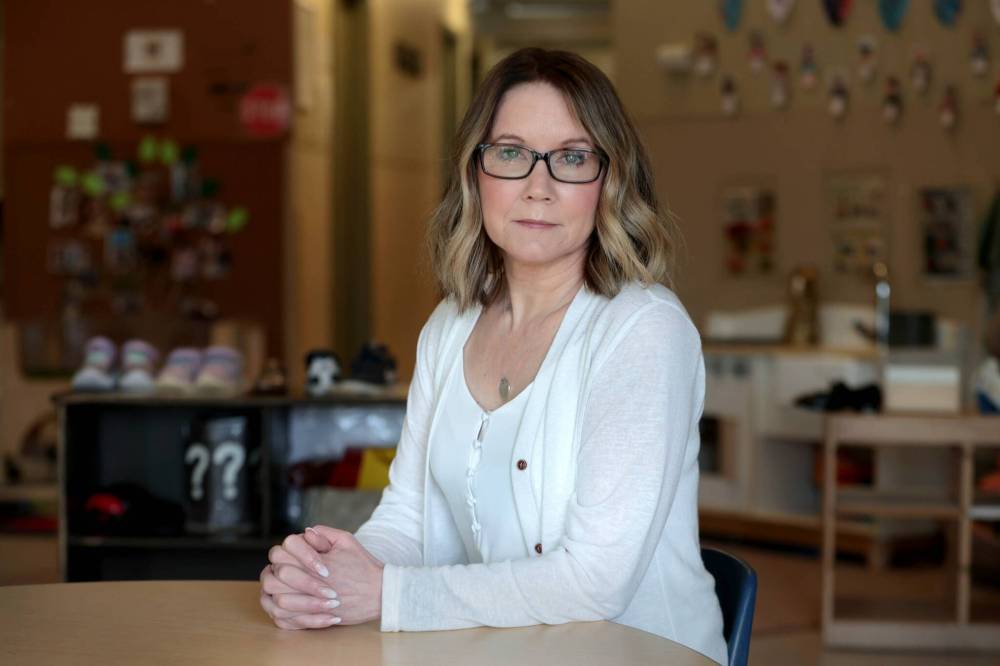
RUTH BONNEVILLE / FREE PRESS
‘The program is a disaster,’ says Cathy Gardiner, Executive Director of Learning and Growing Daycare in Charleswood.
Gardiner has been at her centre for more than 30 years and says, based on what she’s heard from colleagues, more centres will be opting out if the government doesn’t change its approach.
“I’ve seen a lot of kids and it’s tough work,” Gardiner adds. “With the way it is now, it’s that family and that child that are the ones that are going to suffer for it. The program is a disaster.”
Lam, who runs Seven Oaks, one of the province’s most inclusion-friendly centres, says she would never withdraw care for the children currently in her program. She used to have more than 10 ISP children, but that’s been halved in recent years because of the ongoing challenges to obtain and keep funding.
She’s already spoken to her board of directors about shuttering the program. Not because she’s unwilling to fight — “I will always advocate for these families” — but she can’t afford to top up salaries, while her centre, like many others across Manitoba, continues to run a deficit after years of having their operating budgets frozen by the previous Conservative government. Despite her best efforts, Lam’s ISP workers still earn less than $19 an hour.
“That breaks my heart so much, and when I had to speak to my board about that, I was very emotional because that is what our program has always been known for, is our inclusion program,” she says. “We would obviously let them finish our program, but just not fill their spots. Because usually when they finish, I fill it with a new child because we have our inclusion staff in place, we have our inclusion team. It would also mean staff losing their jobs.”
For an industry that’s already dealing with a shortfall of more than 1,000 early childhood educators, it can’t afford additional losses, especially those who’ve embraced their roles as ISP staff.
“With the way it is now, it’s that family and that child that are the ones that are going to suffer for it.”–Cathy Gardiner
The situation is so dire that some centres are demanding parents provide a letter saying there is nothing wrong with their child, or will only start a child on a three-week trial basis, several directors told the Free Press.
“That’s how you weed out these kids who are more work,” Cosser says. “Kid comes in, then in the first three weeks there’s some behaviour problems. Then it becomes, ‘Yeah, no, we don’t want your child here because we don’t want to do that work.’ I know that happens all the time, and it’s wrong and it shouldn’t be happening.”
Lisa Hrechkosy, who is the executive director at Stanley Knowles Child Care, doesn’t blame centres for cancelling their ISP, even if she’s vowed to keep hers running.
What’s hurting centres most, she says, is the inexcusable amount of time it takes to get the funding for a child who already has a space. Children can start exhibiting concerning behaviour as they grow out from infancy, or in far more cases, families either don’t disclose or aren’t aware of their child’s challenges, whether they be medical or behavioural.
Because of the lengthy delays in obtaining the additional ISP care — which is only strained further, directors say, by the government’s penchant for misplacing paperwork — centres feel they have two choices. They can either manage the issue with their current resources, putting stress on the entire staff, risking burnout and adding to an already incredible amount of staff turnover, or make the difficult call to deny care.
“We’ve had to ask parents to pick up their kids and we’ve had to suspend care, which is really unfortunate,” Hrechkosy says.
“I understand where parents are coming from, as well. They don’t want to be told no. That’s where we’re at right now. I’m finding our program is saying no more often to these children, which is such a heartbreaking situation.”
— with files by Katrina Clarke
jeff.hamilton@winnipegfreepress.com

Jeff Hamilton
Multimedia producer
Jeff Hamilton is a sports and investigative reporter. Jeff joined the Free Press newsroom in April 2015, and has been covering the local sports scene since graduating from Carleton University’s journalism program in 2012. Read more about Jeff.
Every piece of reporting Jeff produces is reviewed by an editing team before it is posted online or published in print — part of the Free Press‘s tradition, since 1872, of producing reliable independent journalism. Read more about Free Press’s history and mandate, and learn how our newsroom operates.
Our newsroom depends on a growing audience of readers to power our journalism. If you are not a paid reader, please consider becoming a subscriber.
Our newsroom depends on its audience of readers to power our journalism. Thank you for your support.